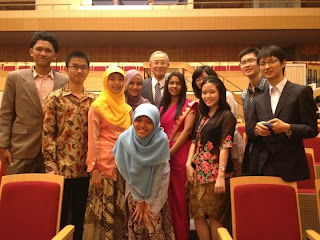Satu bulan ini aku ngerasa produktif sekali menulis, karena tuntutan tugas sih haha. Yang pertama final writing buat kelas English. Nyelesain kelas ini juga rasanya penuh perjuangan *halah* .Mau nggak mau matkul English ini harus diambil karena matkul wajib. Gurunya sih enak-enak aja, cuma karena bahasa Inggris saya masih belepotan *makanya belajar chaa* dan lagi harus menulis dan berbicara dalam kelas rasanya jadi beban tersendiri. But anyway this class has finished alhamdulillaah :)
The Differences in Evaluation System of
Students Achievement
Between
Indonesia and Japan
Indonesia and Japan have similarities in terms of general basic education
system which includes primary
school and secondary school which is
divided into two levels : junior high school and senior high school. Indonesia
has its own name for each level of study, they are Sekolah Dasar (primary
school), Sekolah Menengah Pertama (junior high school), and Sekolah Menengah
Atas (senior high school) which means Shougakkou, Chuugakkou, and Koukou in
Japanese. This basic education system take 12 years in total. Primary school
takes 6 years whereas secondary school takes three years for each level. Even
though the general basic education system between these two countries is quite
similar, there is a difference in how the schools evaluate the students
achievement in primary and secondary school.
In Indonesia, each school conducts final exam every year in every level
to decide whether the students deserve to go the higher level or not. For
instance, if the school determines that the students have to get average score
at least 70 above in the final exam to pass and a fifth grade student got 65 in
his final exam, he could not continue to the sixth grade and would have to stay
in the same class for a year. The same rule also applies if the students want
to go from elementary school to junior high school, from junior high school to
senior high school, and from senior high school to university. Yet, the exam is
not the usual exam. It is called as national examination and maybe it is one of
the most important examination for the students. This examination is conducted by the government
under the Ministry of Education and it evaluates some subjects based on
subjects that students have taken in their classes such as mathematics,
English, Bahasa Indonesia, natural science, and social science. Once the result
of this test has come out, this score determines whether the students can
graduate from the previous school or have
to retake the same class again for a year.
Compared
to Indonesia education system for primary and secondary school, Japan has a
different way to evaluate the students. Japanese schools have adopted an
automatic promotion system wherein students move on the next grade based on
age. According to Adeluna’s report about education in Japan, “One thing that is
interesting in Japanese education system is basic education (shougakkou) did not recognize any final exam . Students
who have completed the study in the first grade will automatically continue to
the second grade, and so on. There is no final exam because the elementary and
junior high schools (chuugakkou) are still included in the compulsory
education, so the students who have completed their studies at the primary
level can go directly to the junior high school.”
So, how do teachers evaluate their students? Of course, there is still an
evaluation process. The teachers do the occasional test to see the students’
ability in the lesson. In the junior high school and senior high school, there
are exams like mid test and final test which are held to evaluate students but they
are not mandatory. Only some prefectures are carrying out these tests. A final
test is held simultaneously for three days, and the test material was made by
the school based on the standards of the Educational Board in the prefecture.
Assessment of students is not only based on the results of the final test, but on
the accumulation of daily test scores, extra-curricular activities, a mid-term test
and a final test. With this kind of system, of course, almost 100% of students
can graduate and continue to the next level.
The question is which one is better : doing a kind of test such as a
so-called national examination or adopting automatic promotion system?
Firstly, let us evaluate the national examination in Indonesia. National
examination is aimed to measure and maintain the quality of education
nationwide. Fitry Mayanti states, “In short, we can say that National
Examination is a legal measuring instrument specified by National Education
Ministry as the determinant of students’ passing grade in primary and secondary
schools, and it is a rightful national standard and has the same right for
every student who has this certificate of National Examination.” Fitry basically says that if many students
passed the national examination, it is one of indication that the schools could
apply the standard national education curriculum properly. For this reason, the
government argues that the national examination will be needed constantly,
whatever the constraints are. But, is it fair to conduct national examinations
for education standards when in fact there are many children in Indonesia who
cannot get good education? Look at the schools’ condition outside Java Island
and we could realize that there is till no such
thing as an education standard in Indonesia. Moreover, national
examination seems irrelevant to the national curriculum ,which the teacher
should measure three aspects of student learning : cognitive, affective, and
psychomotor, since it only examines four to six subjects among all subjects which
are being taught at school and the questions are all in multiple choice form.
How could the government judge the students’ achievement by conducting this
kind of test? In his writing, Rasheed maintains that, “National examination is
narrowing the definition of education. Education does not only covers cognitive
faculty. It also covers attitude, personality, and skills. Hence, determining
whether a student passes his education by means of National Exam only is not in
line with the comprehensive definition of education.” Furthermore, national
examination in Indonesia is a big source of pressure not only for the students
but also for the teachers. Many students are stressed and some commit suicide
because they fail in the national examination. Students somehow do anything in
order to pass this examination and instead of studying hard they choose to
cheat. “Because the exam decides whether a student would pass or not, the
students cheat in the exam in order to get good result. Besides, schools were
also pushed to pass as many of their students as possible because the number of
students that can pass and the average result of the exam they could get
determined their prestige and reputation among the public. For this reason, the
schools demanded that their teachers help the students to cheat in the exam”,
as Rasheed wrote in his writing about pros and cons of national exam. Is this
behavior called as education to educate people so that they could have moral
values? This is really contradictory with the Act of Republic Indonesia Number
20, Year 2003 on National Education System which states, “The 1945 Constitution
has mandated that the Government organize and run one national education
system, based on legal framework, strengthen the people’s faith and piety to
God the Almighty and their moral character as a means for enhancing the
intellectual capacity of the nation.”
However, some people argue that national examination is still necessary to
some extent. For instance students are
encouraged and motivated to study more in order to pass this examination.
Because national examination has a national standard all over the country,
students who pass this examination could gain confidence since they could
compete with other Indonesian students and of course their parents would proud
of them too. Similar to the students, the school especially the teachers would
do the best to teach for the success of their students. Other reason is until
now there is not any examination beside national examination that can be a standard
evaluation for all schools in Indonesia since graduation requirements vary each school.
Let us move to evaluate automatic promotion system in Japan. In my
opinion, this system is designed for uniformity purpose so that every student
in the same age gets the same education process. This system does not recognize
any students who failed and had to repeat the same class because everyone must
continue to higher level together.
According to research which is conducted by Center for US-Japan
Comparative Social Studies,the uniformity of Japanese education system is one
key to the success of Japanese education, “Japanese primary and secondary
schools have produced a workforce with solid knowledge and a strong work
ethic. There are many reasons for this
success: longer school days, a uniformly high standard of curriculum, excellent
teachers, active parental involvement in education, and respect for
education. During the 1980s and the
early 1990s, foreign scholars and journalists praised Japanese education for
producing an educated and industrious workforce for economic and technological
success.” This kind of uniformity in
education is also discussed by Ichikawa Shogo in his paper “Distinctive
Features of the Japanese Education System” , “It is also claimed that
egalitarianism and group consciousness
in the schools contribute to a high standard of student achievement, but that
at the same time, they hamper the development of individuality and creativity. In the same way, while
centralized educational administration
and finance are criticized as the main
cause of the uniformity in Japanese
education, it is also considered to be helpful in maintaining a high national
standard of education with few differences in conditions throughout the country.” Maybe this system sounds nice for students
because they could pass to higher level automatically. It also prevents
jealousy or low self esteem among
students if some of them could not continue to the higher level. But, this
system also causes low motivation to
compete with each other thus they do not want to study hard.
Even though there is not any national examination in Japanese education
system, the school sometimes still conducts final exam. But, the main point
here is that the graduation requirements are not purely based on final exam but
on the accumulation of daily test scores, extra-curricular, mid exam and final
exam, also considered as a whole requirements for the students to pass. As the
Center for US-Japan Comparative Social Studies states, “The government
administers the educational system in order to produce educated and responsible
citizens. First, schools transmit
knowledge, and develop the cognitive, physical, emotional, and social skills of
students. Secondly, schools train
students to become responsible citizens.
The Japanese government regards the human capital of the Japanese people
as the nation’s most valuable natural resource.”
In sum, the writer prefers combining these two country’s education system
than choosing one of them to evaluate students’ achievement at school because
each system has its own advantages and disadvantages so it is really hard to
choose which one is better. The national examination could be done as long as
there is educational equity across the country. But, this examination does not
specify 100% of student graduation but the accumulation of daily test scores,
extra-curricular, mid exam and final exam are also being considered as
graduation requirements.
References
Center for US-Japan Comparative Social Studies (2005), Japanese Education
in the 21st Century.
Ichikawa Shogo (1991), Distinctive Features of Japanese Education. NIER
Occasional Paper, National Institute for Educational Research
Thanks buat yang udah bantuin nyariin data buat nyelesain writing ini :p

















